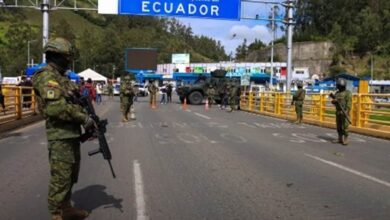Ecuador’s Digital Battle: Combating Misinformation and Hate Speech

As Ecuador embraces the digital age, a new tool called ‘Emonitor+’ has emerged to combat misinformation, hate speech, and gender-based violence in political discourse. This innovative system reflects a growing global effort to protect democracy in the face of new digital threats.
A Digital Shield for Democracy
Ecuador is no stranger to the complexities of modern political discourse, especially in an era where misinformation and hate speech can spread faster than ever before. The nation’s electoral body, the Consejo Nacional Electoral (CNE), in collaboration with the United Nations Development Programme (UNDP), launched a powerful tool called ‘Emonitor+’ to help address these very challenges.
This tool, first developed and tested in other countries like Peru, is designed to automatically identify and track instances of misinformation, hate speech, and gender-based violence in digital political conversations. Ecuador is now adopting it to safeguard its democracy in the face of a growing threat of disinformation campaigns and toxic online rhetoric.
Speaking at the launch event, Diana Atamaint, the president of Ecuador’s CNE, remarked, “We recognize that misinformation has emerged as one of the greatest enemies of modern democracies. This new pandemic undermines the integrity of elections and erodes trust in our institutions.” This tool will allow Ecuador to monitor and combat the growing tide of false narratives and harmful online behavior.
The ‘Emonitor+’ initiative, part of a larger project known as the ‘Strengthening Democratic Electoral Institutions’ Project, is a joint effort funded by international partners, including the European Union (EU), the Spanish Agency for International Development Cooperation (AECID), and the Swiss Embassy. The project seeks to use cutting-edge digital solutions to protect the integrity of elections and ensure an inclusive, safe political environment for all.
The Role of Technology in Securing Elections
The ‘Emonitor+’ tool is more than just a monitoring device—it represents a broader shift toward using technology to protect democratic processes. By employing advanced algorithms, the tool can automatically scan large volumes of online content to detect and categorize instances of hate speech, gender-based violence, and misinformation.
This is not the first time the UNDP has implemented ‘Emonitor+.’ The tool has already been tested in other countries with fragile institutional frameworks, where it successfully identified harmful political rhetoric. According to Inka Mattila, the UNDP representative in Ecuador, “This tool provides concrete results by using digitalization to address issues central to democratic integrity, placing people at the heart of the solution.”
In Ecuador’s case, the tool has been adapted to the country’s specific needs. It helps identify toxic content and enables the CNE and other stakeholders to respond swiftly to emerging threats. Analyzing data in real-time, ‘Emonitor+’ can provide insights that allow officials to make informed decisions, preventing harmful narratives from spreading uncontrollably and affecting public perception.
Mattila also emphasized how digital tools like ‘Emonitor+’ offer a way to overcome other democratic challenges, such as limited access to information and the rise of digital violence, particularly against women. As she explained, “In the digital era, violence against women in politics has taken on a new form and intensity. This tool helps address this critical issue.”
Global Support for Democracy in Ecuador
The global community has supported Ecuador’s efforts to enhance its electoral processes and protect democracy. International partnerships, such as those formed with the EU, Spain, and Switzerland, reflect a shared understanding of safeguarding elections in the digital age.
These countries have provided financial support and technical expertise to ensure the success of Emonitor+. The European Union, in particular, has long supported initiatives to strengthen democratic institutions in Latin America. Their investment in the Emonitor+ project underscores their commitment to ensuring that elections in Ecuador remain free from harmful interference.
Ecuador’s CNE also received technological equipment to modernize its National Training Directorate as part of the broader international effort. These tools will help train CNE staff and civil society groups to use the ‘Emonitor+’ system effectively and ensure they can tackle misinformation and hate speech in real time.
Combating Misinformation
While Ecuador is making strides in addressing these issues, it is essential to recognize that its challenges are not unique. Misinformation and toxic political discourse are global phenomena affecting democracies across Latin America and beyond.
Countries like Brazil, Mexico, and Argentina have similarly grappled with the spread of false information during elections. In Brazil, for example, misinformation surrounding political candidates during the 2018 presidential elections created widespread confusion among voters. Platforms like WhatsApp were flooded with rumors and conspiracy theories, highlighting the urgency of monitoring digital spaces during elections.
Similarly, in Mexico, disinformation campaigns have targeted candidates, voters, and entire political movements, eroding public trust in democratic institutions. Argentina has also experienced its share of political manipulation through social media, with harmful narratives affecting voter turnout and public perception.
In response, many countries in Latin America are now turning to technology to help address these challenges. Like Ecuador, they are developing systems that allow electoral bodies to monitor digital conversations and combat misinformation. These efforts highlight a broader trend toward leveraging technology to protect democracy and ensure the integrity of elections in the region.
The Fight Against Gender-Based Violence in Politics
One of the most alarming trends identified by ‘Emonitor+’ is the rise of gender-based violence in political discourse. Female candidates, activists, and politicians are increasingly becoming targets of harassment and abuse, both online and offline. This form of violence not only deters women from participating in politics but also undermines the democratic process by creating an environment of fear and intimidation.
In Ecuador, gender-based political violence has taken on a new dimension in the digital age, with social media platforms becoming battlegrounds for toxic rhetoric and abuse. As Mattila pointed out, “Political violence based on gender is taking on a new face in the digital era, and it’s becoming more aggressive.”
‘Emonitor+’ is equipped to detect and categorize these harmful behaviors, providing electoral authorities with the data they need to intervene. By addressing this issue head-on, Ecuador hopes to create a more inclusive political environment where women can participate without fear of violence or harassment.
This challenge is not unique to Ecuador, however. Across Latin America, women in politics face similar threats. In countries like Bolivia, Colombia, and Peru, female politicians have reported increasing levels of online harassment, often aimed at silencing their voices and undermining their campaigns. The rise of digital platforms has made it easier for perpetrators to hide behind anonymity, making it all the more difficult for authorities to hold them accountable.
By addressing this issue through tools like ‘Emonitor+,’ Ecuador is positioning itself as a leader in the fight against gender-based violence in politics. This is a critical step toward ensuring that democracy remains inclusive and representative of all citizens, regardless of gender.
The Future of Digital Democracy
As Ecuador moves forward with the implementation of ‘Emonitor+,’ it is clear that the country is committed to addressing the challenges posed by the digital age. Misinformation, hate speech, and gender-based violence are all threats to the democratic process. Still, with the right tools and international support, Ecuador shows that these challenges can be overcome.
The launch of ‘Emonitor+’ reflects a broader trend in Latin America, where countries increasingly turn to technology to protect their democracies. As the region faces political instability, corruption, and external interference, these digital tools will become even more critical in ensuring that elections remain free, fair, and transparent.
Ecuador’s experience with ‘Emonitor+’ is a valuable case study for other nations facing similar challenges. By investing in technological solutions, fostering international cooperation, and addressing the root causes of disinformation and violence, countries across Latin America can take meaningful steps toward safeguarding their democracies in the digital age.
In the end, the success of these initiatives depends on the willingness of governments, civil society, and international partners to work together. With the right strategies in place, democracy in Latin America can be strengthened, and the digital threats that loom over the political landscape can be effectively managed.
Also read: New Species of Glass Frog Discovered in Ecuador
The implementation of ‘Emonitor+’ in Ecuador marks a pivotal moment in the fight against misinformation, hate speech, and gender-based violence in politics. As digital platforms continue to play an ever-growing role in political discourse, tools like ‘Emonitor+’ will be crucial in protecting the integrity of elections and ensuring that democracy remains inclusive and fair for all. Through international collaboration and a commitment to innovation, Ecuador is leading the way in confronting the challenges of the digital age head-on.





